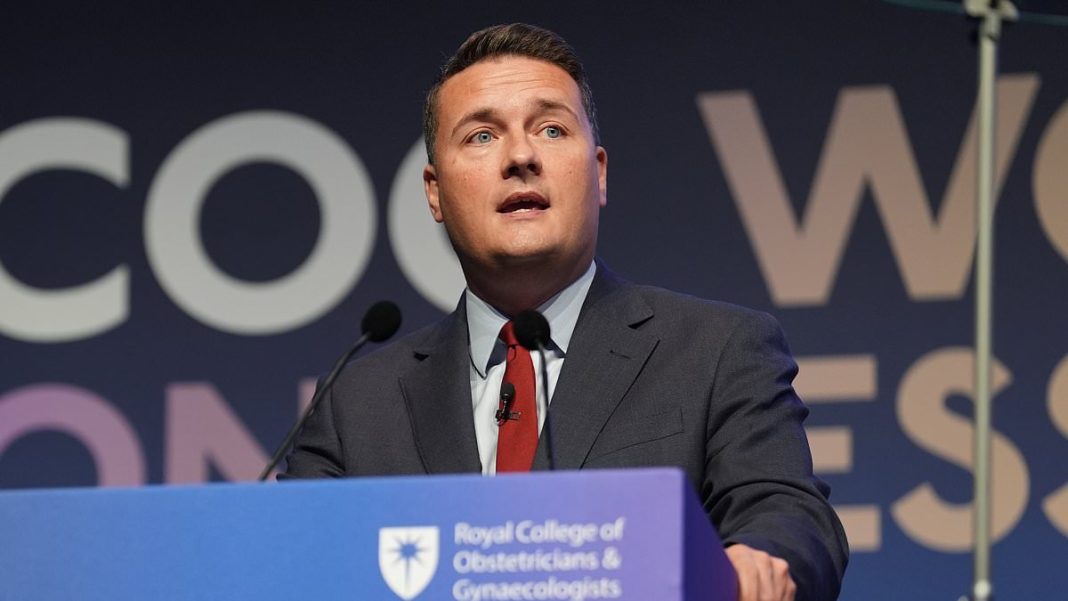Wes Streeting has today announced a ‘rapid national investigation’ into England’s maternity units following a litany of scandals that have rocked the NHS.
Speaking at Royal College of Obstetricians and Gynaecologists World Congress, the Health Secretary said he was launching the urgent review after meeting dozens of families who had been bereaved by failings.
The probe will look at the 10 worst-performing maternity and neonatal services in the country, including Leeds, Sussex, Gloucester, and Mid and South Essex.
It will begin this summer and report back by December 2025.
Mr Streeting said risk is ‘considerably higher’ than it should be for women and babies because of a ‘crisis’ in maternity and neonatal services.
It comes in the wake of a string of harrowing baby death scandals in Shrewsbury and Telford, East Kent, Morecambe and Nottingham, with a record number of services now failing to meet safety standards.
Last year, the maternity regulator found two-thirds of services either ‘require improvement’ or are ‘inadequate’ for safety.
Addressing the congress, Mr Streeting said: ‘Over the last year, I’ve been wrestling with how we tackle problems in maternity and neonatal units, and I’ve come to the realisation that while there is action we can take now, we have to acknowledge that this has become systemic.
‘It’s not just a few bad units. Up and down the country, maternity units are failing, hospitals are failing, trusts are failing, regulators are failing.
‘There’s too much obfuscation, too much passing the buck and giving lip service.’
He added: ‘I have been meeting bereaved families from across the country who have lost babies or suffered serious harm during what should have been the most joyful time in their lives.
‘What they have experienced is devastating—deeply painful stories of trauma, loss, and a lack of basic compassion—caused by failures in NHS maternity care that should never have happened.
‘Their bravery in speaking out has made it clear. We must act and we must act now.
‘I know nobody wants better for women and babies than the thousands of NHS midwives, obstetricians, maternity and neonatal staff, and that the vast majority of births are safe and without incident, but it’s clear something is going wrong.
‘That’s why I’ve ordered a rapid national investigation to make sure these families get the truth and the accountability they deserve, and ensure no parent or baby is ever let down again. I want staff to come with us on this, to improve things for everyone.
‘We’re also taking immediate steps to hold failing services to account and give staff the tools they need to deliver the kind, safe, respectful care every family deserves.
‘Maternity care should be the litmus test by which this Government is judged on patient safety, and I will do everything in my power to ensure no family has to suffer like this again.’
The investigation will consist of two parts.
The first will urgently investigate up to 10 of the most concerning maternity and neonatal units to give affected families answers as quickly as possible.
The second will undertake a system-wide look at maternity and neonatal care, bringing together lessons from past inquiries to create a national set of actions to improve care across every NHS maternity service.
Mr Streeting also said the review would be co-produced with the victims of maternity scandals, giving families a voice into how the inquiry is run.
This includes looking at individual cases of families in Leeds and Sussex who suffered from NHS failures.
The Health Secretary told the conference: ‘I’m currently discussing with Leeds families the best way to grip the challenges brought to light in that trust by their campaigning, reports in the media and the latest CQC report.
‘I’ll be ordering an investigation into nine specific cases identified by families in Sussex who are owed a thorough account of what happened in those cases.
‘I’m also establishing a national maternity and neonatal task force, which I will chair, bringing together experts, staff, campaigners and representatives of families to help drive improvement across the NHS.’
In March 2022, an investigation into services at the Shrewsbury and Telford NHS trust found that neglect and poor care provision caused 200 babies and nine mothers to needlessly die.
An obsession with stamping out C-sections, in order to drive up natural birth rates, was also partly blamed.
Earlier this year, Nottingham University Hospitals (NUH) NHS Trust was handed a £1.6million fine in court for a ‘long list of failings’ in its maternity care provisions.
NUH is currently at the centre of the largest ever inquiry into NHS maternity care.
The organisation was charged with five counts of failing to provide adequate care, exposing the babies or their mothers to a risk of serious harm, and a sixth related to harm caused to Quinn.
The trust is the first to be prosecuted by the maternity regulator the Care Quality Commission (CQC) more than once.
The Birth Trauma Association charity says an estimated 20,000 women a year develop post-natal post traumatic stress disorder, and that as many as 200,000 women may also feel traumatised by childbirth and develop some of the symptoms of PTSD.
About 65 per cent of the NHS’s budget to cover clinical negligence claims—which totalled £69.3billion in 2022-23—related to maternity and neonatal liabilities.
Frontline midwives have previously warned working in the NHS is like playing a ‘warped game of Russian roulette’, as there was a risk of harm or death at any time, partly due to ‘dangerously’ low staffing levels.
The Royal College of Midwives (RCM) suggests staff shortages and lack of funding is making it harder for midwives to deliver better quality services.
The RCM’s latest calculation is that England is short of 2,500 midwives.
It comes as MailOnline revealed in April that around 55 per cent of all maternity services nationwide are failing.
That is according to the most up-to-date CQC ratings, which judge every facility as either ‘outstanding’, ‘good’, ‘requires improvement’ or ‘inadequate’.
This marks a slight improvement of levels seen under the regulator’s own sweeping probe in 2023 (65 per cent).
Another report into NHS maternity care last year also ruled good care is ‘the exception rather than the rule’.
A hugely-anticipated parliamentary inquiry into birth trauma, which heard evidence from more than 1,300 women, found pregnant women are being treated like a ‘slab of meat’.
At the time, then health secretary Victoria Atkins labelled testimonies heard in the report ‘harrowing’ and vowed to improve maternity care for ‘women throughout pregnancy, birth and the critical months that follow’.






